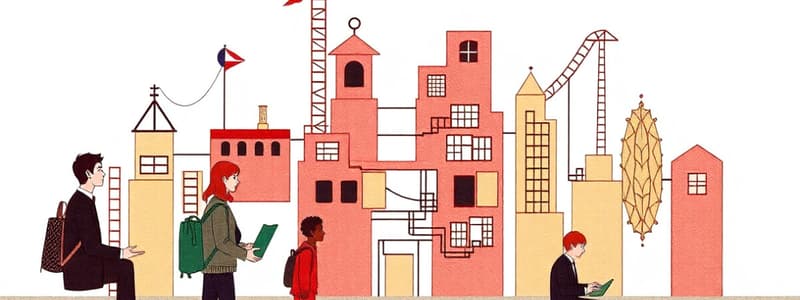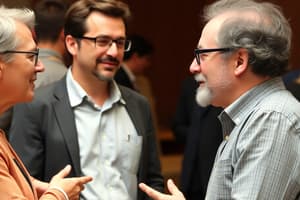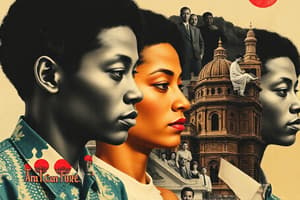Podcast
Questions and Answers
Within the framework of sociological analysis, which statement best encapsulates the nuanced interplay between individual agency and social structure?
Within the framework of sociological analysis, which statement best encapsulates the nuanced interplay between individual agency and social structure?
- Social structures unilaterally determine individual actions, thereby precluding any form of autonomous decision-making or behavioral divergence.
- Individual agency operates independently of social structures, primarily shaping personal trajectories and life outcomes.
- Social cohesion is prioritized over individual agency, fostering alignment to existing rules.
- Individual agency and social structures engage in a dialectical relationship, wherein agency is both constrained and enabled by structure, and structure is, in turn, continuously reshaped by the aggregate of individual actions. (correct)
Given C. Wright Mills' concept of the sociological imagination, how might one critically assess the dominant narratives surrounding meritocracy in a society characterized by significant wealth inequality and differential access to educational resources?
Given C. Wright Mills' concept of the sociological imagination, how might one critically assess the dominant narratives surrounding meritocracy in a society characterized by significant wealth inequality and differential access to educational resources?
- By advocating for redistributive policies without interrogating existing structures.
- By attributing disparities in socioeconomic outcomes solely to variations in individual effort and innate abilities, while disregarding systemic barriers.
- By interrogating the structural conditions that perpetuate inequality, such as regressive tax policies and unequal school funding, and evaluating how these conditions shape individual opportunities and life chances. (correct)
- By acknowledging the existence of inequality, but framing it as an inevitable consequence of natural talent distributions and market forces.
How does the concept of 'social construction' challenge conventional understandings of reality, and what are its implications for sociological inquiry?
How does the concept of 'social construction' challenge conventional understandings of reality, and what are its implications for sociological inquiry?
- It reinforces the notion that reality is an objective phenomenon, independent of human interpretation and cultural context, thereby validating positivist methodologies in sociological research.
- It suggests that reality is a subjective phenomenon, uniquely perceived by each individual without shared or collective influence.
- It advocates for purely quantitative observations.
- It posits that what we perceive as 'real' is actually shaped by collective meanings, historical legacies, and institutional arrangements, which implies that sociological inquiry must critically examine how these factors shape our understanding of the world. (correct)
In what ways can mainstreaming students with disabilities into classrooms be considered both an advancement in social inclusion and a site of potential social structural challenges that warrant further sociological analysis?
In what ways can mainstreaming students with disabilities into classrooms be considered both an advancement in social inclusion and a site of potential social structural challenges that warrant further sociological analysis?
How does the sociological concept of 'agency' complicate deterministic perspectives on human behavior?
How does the sociological concept of 'agency' complicate deterministic perspectives on human behavior?
What are the core tenets of the 'sociological imagination' as articulated by C. Wright Mills, and how can it be applied to analyze contemporary issues such as increasing levels of automation across the global economy?
What are the core tenets of the 'sociological imagination' as articulated by C. Wright Mills, and how can it be applied to analyze contemporary issues such as increasing levels of automation across the global economy?
In what ways does Karl Marx's assertion that 'Men make their own history, but they do not make it as they please' encapsulate the complex relationship between human agency and structural constraints?
In what ways does Karl Marx's assertion that 'Men make their own history, but they do not make it as they please' encapsulate the complex relationship between human agency and structural constraints?
How can the sociological concepts of 'social reproduction' and 'social change' be used to analyze the evolution of gender roles in contemporary Western societies?
How can the sociological concepts of 'social reproduction' and 'social change' be used to analyze the evolution of gender roles in contemporary Western societies?
How might a sociologist analyze the phenomenon of 'cancel culture' through the lens of social forces, distinguishing between ideology/culture and social structure to understand its emergence and impact?
How might a sociologist analyze the phenomenon of 'cancel culture' through the lens of social forces, distinguishing between ideology/culture and social structure to understand its emergence and impact?
In what ways do social forces influence individual behavior, and how do sociologists navigate the complexities of studying these influences while acknowledging the role of individual agency?
In what ways do social forces influence individual behavior, and how do sociologists navigate the complexities of studying these influences while acknowledging the role of individual agency?
How can the denial of Bobbi Gibb's entry into the 1966 Boston Marathon be analyzed through the lens of social construction and its implications for understanding gender inequality?
How can the denial of Bobbi Gibb's entry into the 1966 Boston Marathon be analyzed through the lens of social construction and its implications for understanding gender inequality?
Consider the following scenario: A highly skilled software engineer from a low-income background consistently faces rejection in job interviews at prestigious tech firms, despite possessing qualifications equivalent to those of more privileged candidates. How can this scenario be analyzed using sociological concepts such as social structure, ideology/culture, and agency?
Consider the following scenario: A highly skilled software engineer from a low-income background consistently faces rejection in job interviews at prestigious tech firms, despite possessing qualifications equivalent to those of more privileged candidates. How can this scenario be analyzed using sociological concepts such as social structure, ideology/culture, and agency?
Using the concepts of ideology/culture and social structure, how might a sociologist explain the global prevalence of 'neoliberalism' as a dominant economic and political paradigm?
Using the concepts of ideology/culture and social structure, how might a sociologist explain the global prevalence of 'neoliberalism' as a dominant economic and political paradigm?
In what ways can the sociological imagination help us to understand patterns?
In what ways can the sociological imagination help us to understand patterns?
How might a sociologist use the concept of 'social construction' to analyze the concept of race?
How might a sociologist use the concept of 'social construction' to analyze the concept of race?
What is the role of the individual in the theories presented?
What is the role of the individual in the theories presented?
If a society is based on social construction, under what conditions can that particular construction be deemed to be accurate?
If a society is based on social construction, under what conditions can that particular construction be deemed to be accurate?
What would result if individuals are without agency?
What would result if individuals are without agency?
Which is most closely aligned with sociological examination?
Which is most closely aligned with sociological examination?
How can studying sociology benefit university students?
How can studying sociology benefit university students?
What is the relationship between personal struggles and public issues?
What is the relationship between personal struggles and public issues?
If a person makes observations about the world, what element makes their evidence useful?
If a person makes observations about the world, what element makes their evidence useful?
Why was Gibb disallowed from racing?
Why was Gibb disallowed from racing?
What is a good example of a social construction?
What is a good example of a social construction?
What are public issues?
What are public issues?
How does ideology influence behaviour?
How does ideology influence behaviour?
Which comes first ideology or structure?
Which comes first ideology or structure?
How do groups influence each other?
How do groups influence each other?
How have gender roles transformed?
How have gender roles transformed?
What is individual behaviour generally?
What is individual behaviour generally?
What happens when people's behaviour aligns with ideology and structure?
What happens when people's behaviour aligns with ideology and structure?
What is a stable pattern of social relations that makes some behaviours seem easy?
What is a stable pattern of social relations that makes some behaviours seem easy?
In what way is behaviour often seen?
In what way is behaviour often seen?
What should be considered about those with disabilities in education?
What should be considered about those with disabilities in education?
When can medical science be wrong?
When can medical science be wrong?
What is a key element that leads to social change?
What is a key element that leads to social change?
What did Mills suggest?
What did Mills suggest?
How are society and the individual connected?
How are society and the individual connected?
Flashcards
What is sociology?
What is sociology?
The study of society and human interconnectedness, focusing on social constructions and their origins.
Social construct
Social construct
An object of analysis where its reality is derived from social context.
Economics
Economics
The economy and economic behavior
Anthropology
Anthropology
Signup and view all the flashcards
History
History
Signup and view all the flashcards
Psychology
Psychology
Signup and view all the flashcards
Political science
Political science
Signup and view all the flashcards
Linguistics
Linguistics
Signup and view all the flashcards
Economic sociology
Economic sociology
Signup and view all the flashcards
Cultural sociology
Cultural sociology
Signup and view all the flashcards
Historical sociology
Historical sociology
Signup and view all the flashcards
Political sociology
Political sociology
Signup and view all the flashcards
Social construction
Social construction
Signup and view all the flashcards
Sociological Imagination
Sociological Imagination
Signup and view all the flashcards
Individual life vs history
Individual life vs history
Signup and view all the flashcards
Sociological Imagination's purpose
Sociological Imagination's purpose
Signup and view all the flashcards
Biography/Personal troubles
Biography/Personal troubles
Signup and view all the flashcards
History/Public issues
History/Public issues
Signup and view all the flashcards
Co-constitution
Co-constitution
Signup and view all the flashcards
Mills perspective
Mills perspective
Signup and view all the flashcards
Social forces
Social forces
Signup and view all the flashcards
Ideology/culture
Ideology/culture
Signup and view all the flashcards
Ideology in Confirmation
Ideology in Confirmation
Signup and view all the flashcards
Social structure
Social structure
Signup and view all the flashcards
Structure definition
Structure definition
Signup and view all the flashcards
Social constructions
Social constructions
Signup and view all the flashcards
Social reproduction
Social reproduction
Signup and view all the flashcards
Social change
Social change
Signup and view all the flashcards
Social forces
Social forces
Signup and view all the flashcards
Agency
Agency
Signup and view all the flashcards
Study Notes
- Sociology is the study of society and human interconnectedness.
- It examines social constructions and the processes through which they emerge.
- Social constructs include things like the value of money, national identities, and boundaries.
Social Sciences and Humanities
- Economics studies the economy and economic behavior.
- Anthropology focuses on culture.
- History examines the past and how societies change.
- Psychology studies human behavior and the mind.
- Political science deals with the state and interactions between states.
- Linguistics explores language.
Sub-Disciplines of Sociology
- Economic sociology studies the economy and its relationship to society.
- Cultural sociology examines culture and its relationship to society.
- Historical sociology studies the past and its relationship to contemporary society.
- Political sociology studies the state and its relationship to society.
- Social construction examines language and its relationship to society.
- There are 53 sections in the American Sociological Association.
The Sociological Imagination
- C. Wright Mills’ "The Sociological Imagination" connects individual lives to societal history.
- Each person lives a biography within a society and contributes to its shaping.
- Karl Marx stated that men make their own history, but not under self-selected circumstances.
- It emphasizes the co-constitution of individuals and the societies they are embedded in.
- People create societies, which in turn create people.
- Using the sociological imagination involves understanding the relationship between personal troubles and public issues.
Personal Troubles vs. Public Issues
- Social forces are societal-level mechanisms influencing individual character and life trajectories.
- Social forces are ideology/culture and social structure.
- Social forces influence individual character.
- Shared symbolic representation influences how the world is perceived and judged.
- This can influence choices about behavior.
- Stable patterns of social relations reinforced by social institutions is a form of social structure.
- A particular pattern of social structure can influence individual behavior.
How to Become Batman: Applying Ideology
- People often mistake observations of the social world for confirmation of ideological beliefs, rather than seeing how belief produces "evidence."
- Bobbi Gibb applied to run the Boston Marathon in 1966 but was denied entry because women were thought to be not physiologically able to run a marathon.
- Gender and physical ability is a social construction.
- She was disallowed because organizers feared liability if she collapsed; by the current day, 250,000 women have completed the Boston Marathon.
Ideology and Culture
- Ideology (or culture) is a social force influencing the character of society by influencing people's behavior.
- Behavior is experienced uniquely but is socially influenced.
- Ideology influences the array of choices people think they have and makes behavior meaningful.
- It also provides the framework for individual feelings, thoughts, and judgments.
- One situation or behavior can be made meaningful in different ways.
- The "squeaky wheel gets the grease" vs "The nail that sticks out gets hammered down".
Social Structure
- Beliefs, values, and world views shape behavior, but people are likely to engage in specific behaviors regardless.
- Social structure refers to stable patterns of social relations that make certain behaviors seem easy or natural.
- A person's position within social structure, like ideology/culture, influences their behavior.
How to Become Batman: Applying Social Structure
- Social structure constitutes a society's stable patterns of social relations.
- The effects of structural organization of social institutions are often not recognizable, or are naturalized.
Public Policy and Social Structure: Public Education
- In educational segregation, students with disabilities are segregated from able-bodied peers, and networks remain segregated.
- In mainstreaming, students with disabilities are integrated with able-bodied peers and embedded in an integrated social structure.
Social Construction
- Social forces like ideology and social structure produce social constructions.
- Social constructions are elements of reality whose truth comes from the social.
- It is tempting to dismiss them as "not real," but they are as real as the law of gravity.
Social Reproduction and Social Change
- Social reproduction occurs when the same societal configuration is reproduced over time.
- Social reproduction occurs when people's behavior aligns with existing expectations of ideology and social structure.
- Social change occurs when a society's structural configuration transforms over time.
- Social change can be caused by the introduction of new technologies, changes in population makeup, social movements, and political revolution.
Social Forces and Agency
- Social forces like ideology and social structure explain how society influences individuals.
- Society and individuals are co-constituted.
- Individuals influence society.
Agency
- Sociology studies the effects of social forces on behavior, but shouldn't reduce individual behavior to these forces.
- Individuals always make decisions with "agency."
- Agency is always a part of both societal reproduction and social change.
Complicated Relationship
- Sociology excels at explaining patterns in groups due to the complicated relationship between ideology, structure, and agency.
- Most people behave in ways consistent with ideology and structure most of the time.
- Sociologists observe general trends with many exceptions, and these patterns are observable at the level of large groups.
Studying That Suits You
Use AI to generate personalized quizzes and flashcards to suit your learning preferences.




